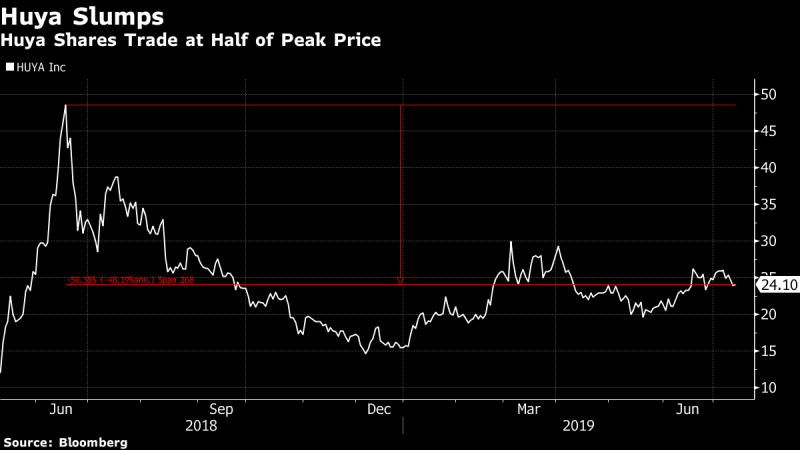

(Bloomberg) — Cameras flashed and fans screamed, as Liu Mou stepped into the spotlight on a sweltering summer evening. In the industrial heartland city of Wuhan, tens of thousands of spectators jam-packed the waterside strip that bore witness to Chairman Mao Zedong’s iconic swims across the Yangtze river half a century ago. In unison, the mob roared “hubby” — the moniker jokingly assigned to many male celebrities in China — and Liu, 28, waved back with a smirk. The crowd was mostly men.
Their adulation was a testament to Liu’s status — not as marriage material — but as one of the brightest stars among China’s gamers. Liu and his fans were on the waterfront for a carnival celebrating the industry, hosted by one of China’s largest game-streaming companies, Douyu. Liu is its biggest celebrity. Every day, he spends at least four hours playing League of Legends and other popular titles, streamed to more than 10 million fans. Here, at the carnival, they were getting a chance to see him in person.
For two nights, out of his own pocket, Liu bought dinner for 3,000 of his followers at two nearby restaurants. As he shuttled between tables of noodles and crayfish for selfies, groupies swarmed to pat his rotund belly, and he laughed out loud. It was an endeavor to thank his fans. “I had a hard time taking care of everyone,” he said.
The three-day festival raked in about 20 million yuan ($2.9 million) in ticket sales, and it’s all part of the race to create China’s equivalent of Amazon’s Twitch, only bigger and potentially more profitable. Douyu is counting on people like Liu to generate revenue via virtual gifts bestowed by fans, potentially showing tech giants like Facebook Inc. and Amazon.com Inc. a new way to monetize game-streaming beyond advertisement and sponsorship. Liu and Douyu’s fate are also intertwined by the same challenge: to prove their spectacular rise is more than a fad but can withstand competition, cash burn and government censorship. Analysts predict the industry could grow to be a $3 billion business in China.
“I choose Douyu because the platform has accumulated a huge base of League of Legends fans,” said Liu, better known by his moniker PDD. “So far our success is built upon each other, and we complement each other.”
Twitch, acquired by Amazon for nearly $1 billion in 2014, is the dominant game-streaming platform in the U.S. Yet its absence from China — due to a government ban — has given local startups a chance to fight for the world’s largest gaming market. Unlike Twitch, which has multiple revenue streams like subscriptions and ads, Chinese platform operators live and die on virtual gifts from fans.
Liu plays exclusively on Douyu, and that partnership is key for the company, which went public in New York in July. Ninety-one percent of Douyu’s revenue came from virtual gifts in the quarter ended March.
Liu alone may have contributed as much as 3% of Douyu’s revenue in the second quarter, according to Ke Yan, a Singapore-based analyst with Aequitas Research. He based his analysis on stats from xiaohulu.com, which monitors virtual gift spending across Chinese streaming services.
Liu’s ability to turn his internet addiction into a fortune reflects a shift in values and consumption amid rising wealth in China. As a teenager, Liu disobeyed his parents when he moved to Shanghai to become a professional gamer for one of the world’s most popular games, League of Legends. Back then, he earned a monthly salary of just $200. He lied to his parents that he was getting as much as $440,000 a year. Plain steamed buns were his go-to food. KFC was a luxury.
It didn’t take long for him to establish a name in the professional gaming world. By putting in more than 15 hours a day for training, he became captain of Invictus Gaming, one of China’s top esports clubs, which won the country its first League of Legends world championship last year. After he retired in 2014, Liu began to stream his gaming sessions full-time on various platforms. Now he lives in a 300-square-meter (about 3200 square feet) downtown apartment, where he broadcasts at least four hours a day to his 10 million Douyu subscribers. One of his few regrets is treating himself to a white Ferrari, as he almost never goes out.
Over the years Liu built a laid-back, wacky persona. When his avatar dies, he yells, “I got cracked open,” a phrase that spawned a world of memes. One time he got so excited for unearthing a rare virtual weapon that he fell off his chair. Another time he spilled water all over his trousers but had no time to change in the middle of a game. “Leak! We have a leak!” Liu cried out to his girlfriend.
Liu’s fans lavish him with virtual fish balls and rockets, ranging from a few pennies to $300 per item. Hardcore devotees like Sun Yi, 22, traveled 24 hours on a train from his village to join the meetup at one of the crayfish restaurants. Wang Jie, a 20-year-old college student, spent months saving up for a plane ticket to Wuhan after watching Liu play League of Legends every night for years. She remembers exactly the moment Liu added her on instant messaging service WeChat — at 2:19 a.m. sharp — she was so excited she had to take laps around a soccer field to calm herself down.
Neither were disappointed. At Douyu’s festival they mingled with thousands, many dressed as elves and warriors — popular gaming avatars — and sauntered down the 1.5 kilometer-long river-side park. On stage, streamers battled away sitting in Tron-like LED lit boxes, while their hack and slash feats were projected onto two giant screens.
Twitch’s ex biggest star, Fortnite gamer Tyler “Ninja” Blevins, has said he earns almost $7 million a year through paid subscribers on the platform alone. Liu might well rival that. Platforms like Douyu pay top gamers like Liu at least $4 million a year to retain them exclusively, says Liu. He also redeems money from virtual gifts from followers, after giving Douyu half the cut.
Liu’s Star Quality by The Numbers
The battle to be the biggest game-streaming platform is costly. The cash burn on marketing and retaining top performers has caused investors to question the business model. Douyu’s arch nemesis, Huya, is trading at only half of its June peak last year.
That doesn’t bode well for Douyu. Despite having a larger user base and more top performers, Douyu lags behind Huya on margin and revenue.
“Notwithstanding Douyu’s strong first quarter performance, Huya is simply a better business,” said Arun George, a London-based analyst at Global Equity Research. “Huya’s higher monetization is likely due to its apps, which enable users to more easily search and discover content that resonates with their personal tastes.”
Huya declined to make executives available for an interview.
The cutthroat competition has edged out smaller players, including Panda TV, Liu’s previous employer. Its downfall has made way for Tencent Holdings Ltd. to dominate game streaming in China.
The social media giant has its own esports site, called eGame, in addition to backing Douyu and Huya. It owns a 37.2% stake in Douyu and 34.6% in Huya. Tencent didn’t respond to requests for comment.
Chen Shaojie, 35, founded Douyu five years ago inspired by Twitch’s success. He says the company’s advantage over Huya is its bigger user base and wider game offerings, which in time will help it generate more revenue.
“Top streamers are extremely valuable for us,” said Chen, who owns a 13.3% stake in Douyu. “After we’re public, we’ll become more experienced with monetization.”
As a public company Douyu will also come under more scrutiny. Streamers often need to spend their own money to buy fan support — a common industry practice that calls to question whether company revenue is inflated. Soon after Douyu signed on Liu in March, he spent nearly 20 million yuan to buy himself votes during Douyu’s annual online idol competition. Half of that money goes to Douyu, and the other half returns to Liu’s pocket. Douyu’s CEO confirmed this.
“These ‘fake’ votes will be still counted as revenue as, under accounting standards, the streamer will be considered a paying customer,” said Global Equity Research’s George. “Douyu’s focus on top streamers makes it more susceptible to this issue compared to Huya.”
Censorship is always another concern. Accounts with millions of followers can get wiped in a day if regulators deem what they post improper. Last year, a top performer got banned because she made fun of Japan’s invasion of China.
Liu learned from their mistakes. He stopped smoking on camera and even donated two million yuan to a school in one of China’s poorest counties. “Your personality and what you say and do, can have a huge influence on fans,” Liu said. “You have to be careful about a lot of stuff.”
Companies like Douyu deploy armies of censors to police virtual content that falls afoul of Beijing. There’s no tolerance for the slightest political satire. No potential risk is too small: Douyu originally planned to throw this year’s carnival at the end of May, but postponed the event for two weeks because authorities were wary of public gatherings around the 30th anniversary of the Tiananmen Square crackdown, according to Douyu organizers who asked not to be named to discuss sensitive matters. Douyu’s CEO said the delay was due to road construction near the venue, citing a previous company statement.
Liu is aware that he won’t be this famous forever. Millions of streamers on Douyu’s platform toil more than four hours a day on the platform, and the rise of a new star player could mean less income for Liu.
So he’s planning for the future. Last August, Liu opened a training camp, which grooms about two dozen teenagers for top games like League of Legends and PlayerUnknown’s Battlegrounds. He earns money when esports clubs sign on his proteges. Earlier this year, Liu also led a 125 million yuan funding round for a talent agency called Elephant Entertainment, which recruits and promotes thousands of streamers. In April, it garnered a 1 billion yuan valuation and the backing of Tencent.
Douyu’s founder is also looking for a second act. China’s game streaming industry has been experiencing a slowdown in growth, partly due to the rise of short video apps like ByteDance’s Douyin, the domestic version of TikTok.
At Douyu’s headquarters in Wuhan’s Optics Valley tech hub, a pair of Siamese fighting fish swim in the tank near the front desk. The popular aquarium species, known for being aggressive and territorial, is a reminder of competition and where the startup get its name from. Douyu literally means “fighting fish.”
“One tank cannot house two fish,” a sign reminds visitors.
To contact the reporter on this story: Zheping Huang in Hong Kong at [email protected]
To contact the editors responsible for this story: Edwin Chan at [email protected], Emily Biuso, Lulu Yilun Chen
<p class="canvas-atom canvas-text Mb(1.0em) Mb(0)–sm Mt(0.8em)–sm" type="text" content="For more articles like this, please visit us at bloomberg.com” data-reactid=”57″>For more articles like this, please visit us at bloomberg.com
©2019 Bloomberg L.P.










